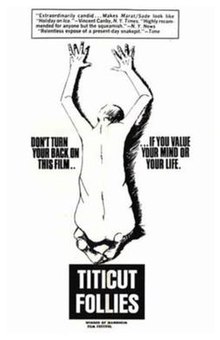Titicut Follies
| Titicut Follies | |
|---|---|

Theatrical release poster
|
|
| Directed by | Frederick Wiseman |
| Produced by | Frederick Wiseman |
| Written by | Frederick Wiseman |
| Cinematography | John Marshall |
| Edited by | Frederick Wiseman Alyne Model |
| Distributed by | Zipporah Films, Inc. |
|
Release date
|
|
|
Running time
|
84 minutes |
| Country | United States |
| Language | English |
Titicut Follies is a 1967 American Direct Cinema documentary film directed by Frederick Wiseman and filmed by John Marshall, about the patient-inmates of Bridgewater State Hospital for the criminally insane, a Massachusetts Correctional Institution in Bridgewater, Massachusetts. In 1967 the film won awards in Germany and Italy. Later on, Wiseman made a number of such films examining social institutions (e.g. hospitals, police, schools, etc.) in the United States.
The title of the film is taken from a talent show put on by the inmates of the hospital, which was named after the Wampanoag name for the nearby Taunton River.
Titicut Follies portrays the existence of occupants of Bridgewater State Hospital holed up in empty cells and only periodically washed. It also depicts inmates/patients required to strip naked publicly, force feeding, and indifference and bullying on the part of many of the institution's staff.
Titicut Follies was the beginning of the documentary career of Fred Wiseman, a Boston-born lawyer turned filmmaker. He originally took his law classes from Boston University to the institution for educational purposes and had “wanted to do a film there.” He began calling the superintendent of the facility looking for permission to film a year prior to production. Wiseman had previously produced The Cool World, a 1964 film based on Warren Miller’s novel and took that experience to inform his desire to direct. He drafted a proposal that was verbally agreed to by the superintendent, which later came into question when the film began distribution. Following that agreement filming did commence, with corrections staff following Wiseman at all times and determining on the spot whether the subjects filmed were mentally competent, adding further confusion to an already fraught process. While on location Wiseman recorded the sound and directed the cameraman with his microphone or hand directions. He hired John Marshall as his cameraman, an established ethnographic filmmaker.
...
Wikipedia
